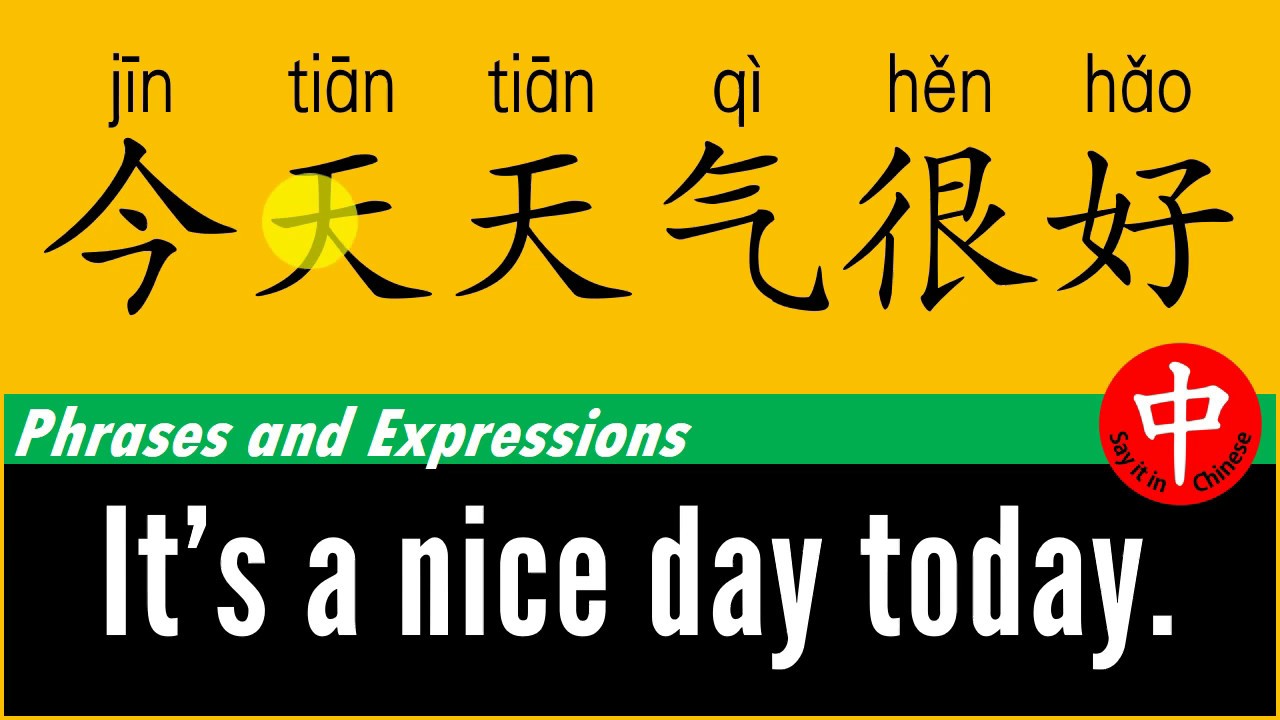
Have a nice day in Chinese – Ways to use this greeting
Have a Nice Day in Chinese – Ways to Use This Greeting When it comes to embracing cultural diversity and connecting with people from different parts of the world, a simple greeting can go a long way. In this article, we delve into the fascinating world of extending warm wishes in Chinese, specifically exploring the […]
Have a Nice Day in Chinese – Ways to Use This Greeting
When it comes to embracing cultural diversity and connecting with people from different parts of the world, a simple greeting can go a long way. In this article, we delve into the fascinating world of extending warm wishes in Chinese, specifically exploring the phrase “Have a nice day.” Beyond the language barrier, this phrase serves as a bridge to forge connections and spread positivity. Let’s unlock the various ways to use this greeting, understand its cultural nuances, and discover how it can enrich your interactions with Chinese speakers.
The Beauty of Multilingual Greetings

Greetings are the building blocks of human interaction, and they carry the essence of each culture they originate from. “Have a nice day” is a universal phrase that transcends borders, making it an ideal choice for cross-cultural communication. Whether you’re a seasoned traveler or a curious learner, using this phrase in Chinese can open doors to meaningful exchanges.
Understanding the Chinese Greeting
In Mandarin Chinese, the equivalent phrase for “Have a nice day” is “祝你今天过得愉快” (Zhù nǐ jīntiān guò dé yúkuài). While this phrase might seem like a tongue twister at first, it’s relatively simple when broken down:
- 祝你 (Zhù nǐ): This means “Wish you.”
- 今天 (jīntiān): Translates to “today.”
- 过得愉快 (guò dé yúkuài): This part wishes for a pleasant day.
So, when you put it all together, you’re essentially saying, “Wish you a pleasant day today.”
Ways to Use the Greeting
- Casual Encounters: When meeting friends or acquaintances in a casual setting, you can greet them with a warm “祝你今天过得愉快” (Zhù nǐ jīntiān guò dé yúkuài). It’s a friendly and thoughtful way to start a conversation.
- Business and Professional Context: In more formal situations, such as a business meeting or when addressing colleagues, you can use a slightly more formal greeting like “祝您今天过得愉快” (Zhù nín jīntiān guò dé yúkuài). This shows respect and professionalism.
- Customer Service: If you work in customer service or hospitality, adding this phrase to your interactions can leave a lasting positive impression on Chinese-speaking customers. It shows that you care about their experience.
- Written Correspondence: Whether in emails or handwritten notes, including this phrase at the beginning or end of your message can add a personal touch.
- Learning and Appreciation: If you’re learning Mandarin Chinese, using this greeting regularly is a great way to practice and show your appreciation for the language and culture.
Cultural Significance
Language is a mirror of culture, and understanding the cultural context behind a greeting can deepen your appreciation for it. In Chinese culture, the concept of harmony and well-wishing is highly valued. By extending wishes for a pleasant day, you are not only being polite but also contributing to positive energy in the environment.
Japanfollow.com’s Take on “Have a Nice Day in Chinese”

Chuyên mục cultrure của Japanfollow.com/ is a website dedicated to providing the latest updates on various cultural topics, including “Have a nice day in Chinese – Ways to use this greeting.” Their insightful coverage delves into the nuances of using this phrase in different contexts, helping readers navigate the intricacies of cross-cultural communication. Don’t forget to follow Japanfollow.com/ to discover more about “Have a nice day in Chinese – Ways to use this greeting.”
Customer Review: A Gen Z Perspective

Let’s take a moment to hear from a satisfied customer who explored the world of “Have a nice day in Chinese – Ways to use this greeting” on Japanfollow.com/:
“OMG, so I was like, on Japanfollow.com, checking out their stuff, and I came across this thing about saying ‘Have a nice day’ in Chinese. It’s like, so cool, you know? I mean, we’re all about vibes and spreading positivity, and this is like the ultimate vibe-spreader. It’s lit! Like, I lowkey feel so cultured now. So, if you’re into, like, learning and being all global and stuff, you gotta check it out. Totes worth it!”
Gen Z speaks its own language, and this review reflects the enthusiasm and inclusivity that this simple greeting can bring to people of all ages.
In conclusion, saying “Have a nice day” in Chinese is more than just words; it’s a conduit for building connections and fostering positivity. Whether you’re using it in casual conversations or professional settings, this gesture transcends language barriers and makes the world a friendlier place, one greeting at a time.
So, go ahead, wish someone a “祝你今天过得愉快” (Zhù nǐ jīntiān guò dé yúkuài), and watch as smiles light up faces, bridging cultures and creating moments of genuine connection.
key words
- learn chinese
- how to say i love you in chinese
- how to say hello in chinese mandarin
- Thank you in Chinese 2024






